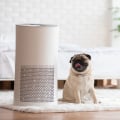Air filters are essential devices used in many places, from homes and offices to industrial facilities and cleanrooms. They are designed to remove solid particles such as dust, pollen, mold, bacteria, and other contaminants from the air. Air filters also provide clean air for car engines and help reduce indoor air pollution. But how do you choose the right air filter for your needs?The main purpose of an air filter is to clean the indoor air to make it healthier to breathe.
The higher the MERV rating of an air filter, the more effective it will be at preventing smaller particles from passing through the filter medium. Fibreglass air filters provide better airflow in HVAC units and are suitable for capturing only large particles. Portable air filters, also known as air purifiers or air sanitizers, are designed to filter the air in an individual room or area. They can reduce indoor air pollution; however, they cannot remove all contaminants from the air. When choosing an air filter, it is important to consider the size of the particles you want to remove from the air.
For example, if you want to remove pollen from your home, you should look for a filter with a MERV rating of 8 or higher. If you want to remove smoke particles, you should look for a filter with a MERV rating of 13 or higher. It is also important to consider the size of your HVAC system when selecting an air filter; if you choose a filter that is too large or too small for your system, it will not work properly. Engine air filters must be replaced between 15,000 and 30,000 miles, depending on the type of vehicle and driving conditions. According to the MIL-STD-282 standard, to be considered a true HEPA filter, the filter must capture at least 99.97% of air particles measuring 0.3 microns in diameter. The benefits of using an air filter are numerous.
Air filters can help reduce allergies and asthma symptoms by removing allergens from the air. They can also help reduce odors in your home by trapping odors and other airborne particles. Air filters can also help improve energy efficiency by reducing strain on your HVAC system. There are a wide variety of technologies and user-defined requirements for air filters, so there are no standardized regulations on the performance and effectiveness of air filters. The most extensive technical guide focuses on air filters for residential use; it does not address air filters used in large or commercial structures.



